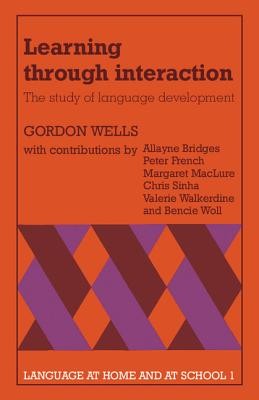
- We will send in 10–14 business days.
- Author: Gordon Wells
- Publisher: Cambridge University Press
- Year: 1981
- ISBN-10: 0521282195
- ISBN-13: 9780521282192
- Format: 14.1 x 21.7 x 2.1 cm, softcover
- Language: English
- SAVE -10% with code: EXTRA
Reviews
Description
There have been many studies of children learning to talk, but perhaps none as comprehensive - in terms of the number of children involved, the period of continuous observation and the scope of the analysis - as the Bristol Study of Language Development. This is the first full-length volume to be written by members of the research team and it is a fundamental study of language development from infancy to primary school. It synthesises the research to date and discusses some key socio- and psycholinguistic themes with reference to transcribed excerpts from spontaneous conversations recorded by the team and to experimental data. The authors' central argument is that conversation provides the natural context of language development and that the child learns through exploring his world of interaction with other people. The quality of learning is seen to depend particularly on the strategies that adults employ to develop and extend children's contributions to interaction. This has important practical implications for the transition from home to school, and the second part of the book examines the differences and similarities between the talk that goes on in these two environments. The final chapter considers the development of literacy. The model of language development presented here will make stimulating and challenging reading for a wide range of sociologists, psychologists and educationalists as well as being of particular interest to linguists.
EXTRA 10 % discount with code: EXTRA
The promotion ends in 19d.10:29:57
The discount code is valid when purchasing from 10 €. Discounts do not stack.
- Author: Gordon Wells
- Publisher: Cambridge University Press
- Year: 1981
- ISBN-10: 0521282195
- ISBN-13: 9780521282192
- Format: 14.1 x 21.7 x 2.1 cm, softcover
- Language: English English
There have been many studies of children learning to talk, but perhaps none as comprehensive - in terms of the number of children involved, the period of continuous observation and the scope of the analysis - as the Bristol Study of Language Development. This is the first full-length volume to be written by members of the research team and it is a fundamental study of language development from infancy to primary school. It synthesises the research to date and discusses some key socio- and psycholinguistic themes with reference to transcribed excerpts from spontaneous conversations recorded by the team and to experimental data. The authors' central argument is that conversation provides the natural context of language development and that the child learns through exploring his world of interaction with other people. The quality of learning is seen to depend particularly on the strategies that adults employ to develop and extend children's contributions to interaction. This has important practical implications for the transition from home to school, and the second part of the book examines the differences and similarities between the talk that goes on in these two environments. The final chapter considers the development of literacy. The model of language development presented here will make stimulating and challenging reading for a wide range of sociologists, psychologists and educationalists as well as being of particular interest to linguists.


Reviews